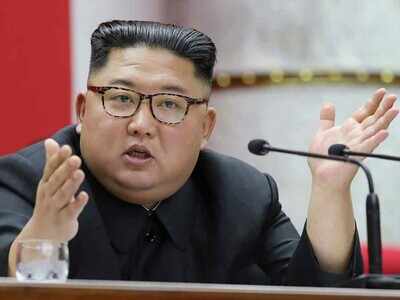
TOKYO: North Korea's collapse has been predicted — wrongly — for decades.
Some said it would happen after fighting ended in the Korean War in 1953. Others thought it would be during a 1990s famine or when national founder Kim Il Sung died in 1994. And when the death of his son, Kim Jong Il, thrust a little-known 20-something into power in 2011 some felt the end was near.
It's no surprise then that recent rumours that leader Kim Jong Un is seriously ill have led to similar hand-wringing.
South Korea believes that Kim is alive and in control, and most analysts agree that even if he weren't, Kim's powerful sister, Kim Yo Jong, would likely take control, possibly with the help of select officials.
Many experts say North Korea would weather the transition just as it has every other upheaval.
But what if it didn't? Here's a look at how other nations might deal with a catastrophe in North Korea.
--The United States--
If the government in Pyongyang should collapse, a US-South Korean contingency plan called OPLAN 5029 would reportedly come into play.
The plan is meant to secure the border and North Korea's nuclear weapons if the government can't function or if control of those weapons becomes uncertain.
“The million-dollar question is: When do you invoke the OPLAN and what indicators do you rely on to do so? Because one country's 'securing the country' operation can look to the other nation like an 'invasion plan.' And then all hell can break loose,” said Vipin Narang, a North Korea nuclear specialist at MIT.
The biggest US worry is North Korea's nuclear stockpile being used, stolen or sold.
“If the U.S. does not have plans to go in and secure and retrieve North Korean nukes — to the extent we know where they are — then we are not doing our job,” said Ralph Cossa, president emeritus of the Pacific Forum think tank in Hawaii.
“Beyond that, it makes little sense for the US
Some said it would happen after fighting ended in the Korean War in 1953. Others thought it would be during a 1990s famine or when national founder Kim Il Sung died in 1994. And when the death of his son, Kim Jong Il, thrust a little-known 20-something into power in 2011 some felt the end was near.
It's no surprise then that recent rumours that leader Kim Jong Un is seriously ill have led to similar hand-wringing.
South Korea believes that Kim is alive and in control, and most analysts agree that even if he weren't, Kim's powerful sister, Kim Yo Jong, would likely take control, possibly with the help of select officials.
Many experts say North Korea would weather the transition just as it has every other upheaval.
But what if it didn't? Here's a look at how other nations might deal with a catastrophe in North Korea.
--The United States--
If the government in Pyongyang should collapse, a US-South Korean contingency plan called OPLAN 5029 would reportedly come into play.
The plan is meant to secure the border and North Korea's nuclear weapons if the government can't function or if control of those weapons becomes uncertain.
“The million-dollar question is: When do you invoke the OPLAN and what indicators do you rely on to do so? Because one country's 'securing the country' operation can look to the other nation like an 'invasion plan.' And then all hell can break loose,” said Vipin Narang, a North Korea nuclear specialist at MIT.
The biggest US worry is North Korea's nuclear stockpile being used, stolen or sold.
“If the U.S. does not have plans to go in and secure and retrieve North Korean nukes — to the extent we know where they are — then we are not doing our job,” said Ralph Cossa, president emeritus of the Pacific Forum think tank in Hawaii.
“Beyond that, it makes little sense for the US
Download
The Times of India News App for Latest World News
Subscribe
Start Your Daily Mornings with Times of India Newspaper! Order Now

Coronavirus outbreak
Trending Topics
LATEST VIDEOS
More from TOI
Navbharat Times
Featured Today in Travel
Get the app









